Regulierung internationaler Finanzmärkte und Banken
Die Forschungsgruppe "Regulierung internationaler Finanzmärkte und Banken" analysiert internationale Kapitalströme und die Auswirkungen von Regulierungsänderungen auf die Finanzstabilität. Integrierte Finanzmärkte begünstigen eine effiziente Kapitalallokation und Risikoteilung – sie erleichtern aber auch die grenzüberschreitende Übertragung von Schocks.
Dementsprechend hat sich die Bankenregulierung in den letzten Jahren weiterentwickelt, wobei die vollen Auswirkungen dieser Reformen noch unklar sind. Daher konzentriert sich die Forschung der Gruppe auf zwei Bereiche:
Erstens werden die Haupttreiber internationaler Kapitalströme und deren Auswirkungen auf Finanzstabilität untersucht. Zeiten hoher Finanzintegration sind oft gefolgt von Krisen mit nachhaltigen realwirtschaftlichen Folgen. Ziel ist es, zu verstehen, wie eine stabile und effektive Kreditvergabe gewährleistet werden kann.
Zweitens wird untersucht, wie sich Veränderungen in der Regulierung und Aufsicht auf das grenzüberschreitende Bankgeschäft auswirken, insbesondere im Kontext der europäischen Integration. Dazu gehört die Bewertung des Trade-offs zwischen regulatorischer Harmonisierung und unbeabsichtigten Marktverzerrungen.
Zwei Datenprojekte tragen zu diesen Forschungsthemen bei: die International Banking Library, eine webbasierte Plattform für den Forschungsaustausch mit einem vierteljährlichen Newsletter, der mehr als 700 Abonnenten erreicht, und die Financial Markets Directives Database, die die Umsetzung der wichtigsten EU-Vorschriften im Bereich Finanzmärkte mit besonderem Schwerpunkt auf der Europäischen Bankenunion dokumentiert. Gemeinsam fördern sie eine evidenzbasierte Politikanalyse und erhöhen die Sichtbarkeit der Gruppe.
Forschungscluster
Wirtschaftliche Dynamik und StabilitätIhr Kontakt

- Abteilung Finanzmärkte
PROJEKTE
10.2021 ‐ 06.2025
Distributional Effects of Macroeconomic Policies in Europe (DEMAP)
Leibniz-Gemeinschaft
Das Projekt untersucht wie politische Maßnahmen auf dem Level der Europäischen Union, wie zum Beispiel der European Recovery Fund, die Ungleichheit zwischen Haushalten beeinflusst.
07.2017 ‐ 12.2022
Die politische Ökonomie der europäischen Bankenunion
Europäischer Sozialfonds (ESF)
Ursachen für nationale Unterschiede in der Umsetzung der Bankenunion und daraus resultierende Auswirkungen auf die Finanzstabilität.
01.2015 ‐ 12.2017
Dynamic Interactions between Banks and the Real Economy
Deutsche Forschungsgemeinschaft (DFG)
Referierte Publikationen
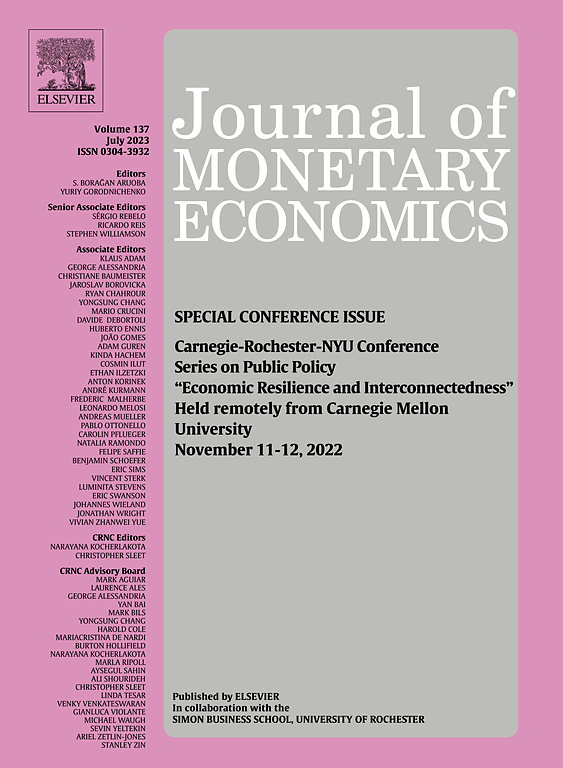
Lending Effects of the ECB’s Asset Purchases
in: Journal of Monetary Economics, December 2020
Abstract
<p>Between 2010 and 2012, the European Central Bank absorbed €218 billion worth of government securities from five EMU countries under the Securities Markets Programme (SMP). Detailed security holdings data at the bank level affirms an effective lending stimulus due to the SMP. Exposed banks contract household lending, but increase commercial lending substantially. Holding non-SMP securities from stressed EMU countries amplifies the commercial lending response. The SMP also improved liquidity buffers and profitability without compromising credit quality.</p>
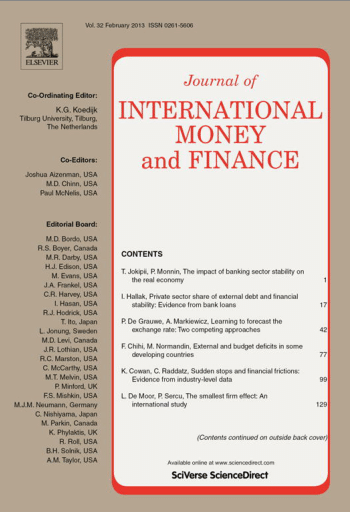
The Impact of Social Capital on Economic Attitudes and Outcomes
in: Journal of International Money and Finance, November 2020
Abstract
This article traces the extant literature on the impact of social capital on economic attitudes and outcomes. Special attention is paid to clarify conceptual ambiguities, measurement techniques, channels of influence, and identification strategies. Insights derived from the literature are then used to analyze the marketplace lending industry in China, where the size of the peer-to-peer (P2P) lending market is larger than that of the rest of the world combined. Ironically, approximately two-thirds of these online P2P lending platforms have failed. Empirical evidence from the monthly operating data of 735 lending platforms and transaction level data from one prominent platform (Renrendai) shows that platforms in provinces with high social capital have low risk of failure, and borrowers in provinces with high social capital can borrow at low interest rate and are less likely to default. We also provide observations to guide future economic research on social capital.

Finance and Wealth Inequality
in: Journal of International Money and Finance, November 2020
Abstract
Using a global sample, this paper investigates the determinants of wealth inequality capturing various economic, financial, political, institutional, and geographical indicators. Using instrumental variable Bayesian model averaging, it reveals that only a handful of indicators robustly matters and finance plays a key role. It reports that while financial depth increases wealth inequality, efficiency and access to finance reduce inequality. In addition, redistribution and education are associated with lower inequality whereas wars and openness to international trade contribute to greater wealth inequality.
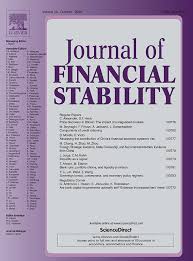
Are Bank Capital Requirements Optimally Set? Evidence from Researchers’ Views
in: Journal of Financial Stability, October 2020
Abstract
We survey 149 leading academic researchers on bank capital regulation. The median (average) respondent prefers a 10% (15%) minimum non-risk-weighted equity-to-assets ratio, which is considerably higher than the current requirement. North Americans prefer a significantly higher equity-to-assets ratio than Europeans. We find substantial support for the new forms of regulation introduced in Basel III, such as liquidity requirements. Views are most dispersed regarding the use of hybrid assets and bail-inable debt in capital regulation. 70% of experts would support an additional market-based capital requirement. When investigating factors driving capital requirement preferences, we find that the typical expert believes a five percentage points increase in capital requirements would “probably decrease” both the likelihood and social cost of a crisis with “minimal to no change” to loan volumes and economic activity. The best predictor of capital requirement preference is how strongly an expert believes that higher capital requirements would increase the cost of bank lending.
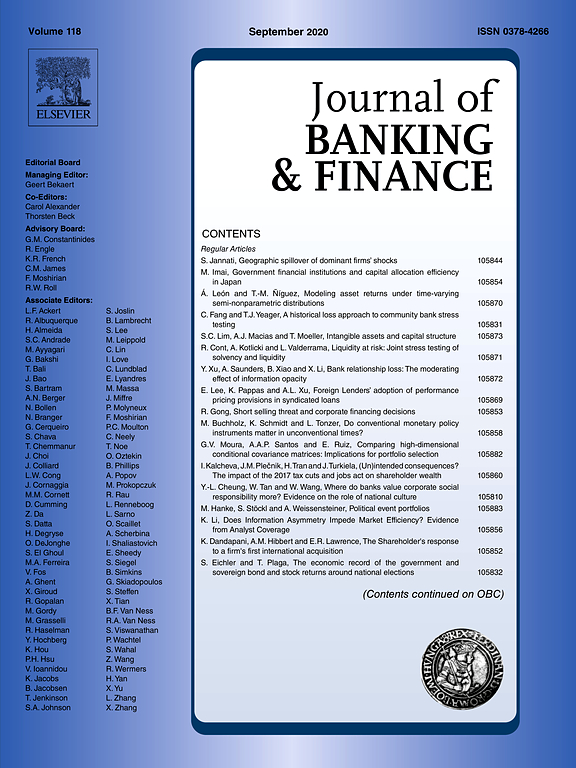
Do Conventional Monetary Policy Instruments Matter in Unconventional Times?
in: Journal of Banking and Finance, Nr. 105874, September 2020
Abstract
This paper investigates how declines in the deposit facility rate set by the ECB affect euro area banks’ incentives to hold reserves at the central bank. We find that, in the face of lower deposit rates, banks with a more interest-sensitive business model are more likely to reduce reserve holdings and allocate freed-up liquidity to loans. The result is driven by banks in the non-GIIPS countries of the euro area. This reveals that conventional monetary policy instruments have limited effects in restoring monetary policy transmission during times of crisis.
Arbeitspapiere
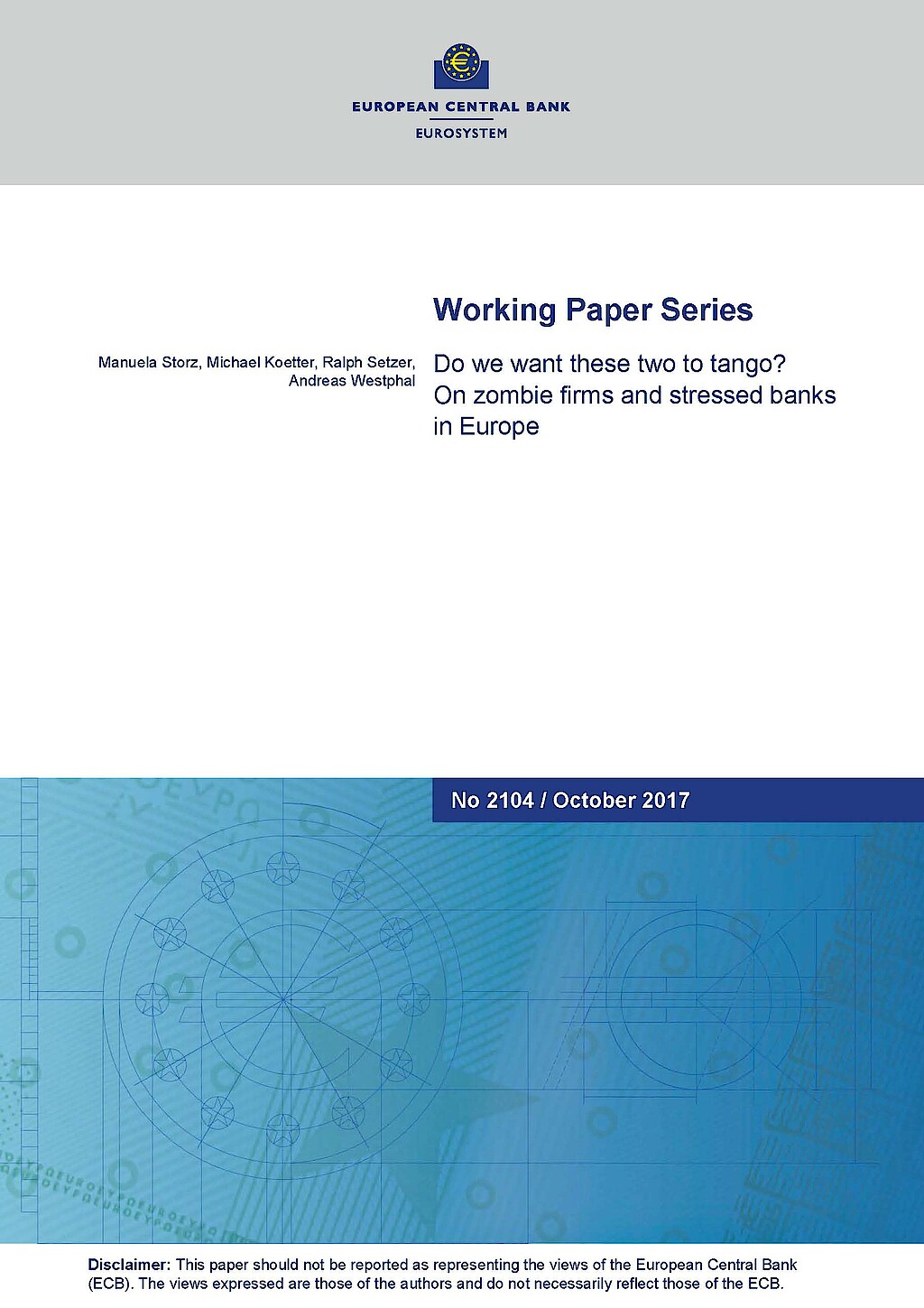
Do We Want These Two to Tango? On Zombie Firms and Stressed Banks in Europe
in: ECB Working Paper, 2017
Abstract
We show that the speed and type of corporate deleveraging depends on the interaction between corporate and financial sector health. Based on granular bank-firm data pertaining to small and medium-sized enterprises (SME) from five stressed and two non-stressed euro area economies, we show that “zombie” firms generally continued to lever up during the 2010–2014 period. Whereas relationships with stressed banks reduce SME leverage on average, we also show that zombie firms that are tied to weak banks in euro area periphery countries increase their indebtedness even further. Sustainable economic recovery therefore requires both: deleveraging of banks and firms.
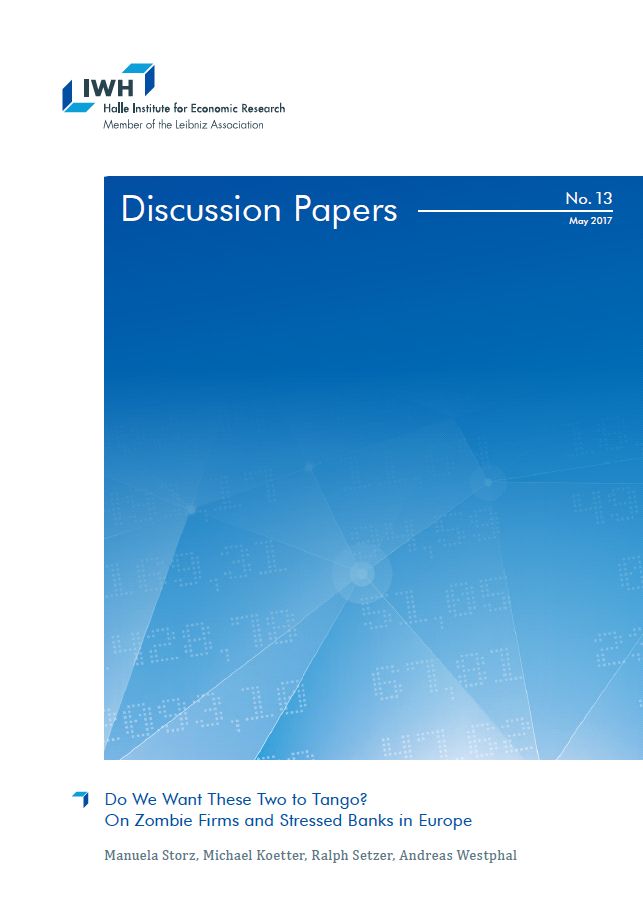
Do We Want These Two to Tango? On Zombie Firms and Stressed Banks in Europe
in: IWH Discussion Papers, Nr. 13, 2017
Abstract
We show that the speed and type of corporate deleveraging depends on the interaction between corporate and financial sector health. Based on granular bank-firm data pertaining to small and medium-sized enterprises (SME) from five stressed and two non-stressed euro area economies, we show that “zombie” firms generally continued to lever up during the 2010–2014 period. Whereas relationships with stressed banks reduce SME leverage on average, we also show that zombie firms that are tied to weak banks in euro area periphery countries increase their indebtedness even further. Sustainable economic recovery therefore requires both: deleveraging of banks and firms.

Inside Asset Purchase Programs: The Effects of Unconventional Policy on Banking Competition
in: ECB Working Paper Series, Nr. 2017, 2017
Abstract
We test if unconventional monetary policy instruments influence the competitive conduct of banks. Between q2:2010 and q1:2012, the ECB absorbed Euro 218 billion worth of government securities from five EMU countries under the Securities Markets Programme (SMP). Using detailed security holdings data at the bank level, we show that banks exposed to this unexpected (loose) policy shock mildly gained local loan and deposit market shares. Shifts in market shares are driven by banks that increased SMP security holdings during the lifetime of the program and that hold the largest relative SMP portfolio shares. Holding other securities from periphery countries that were not part of the SMP amplifies the positive market share responses. Monopolistic rents approximated by Lerner indices are lower for SMP banks, suggesting a role of the SMP to re-distribute market power differentially, but not necessarily banking profits.
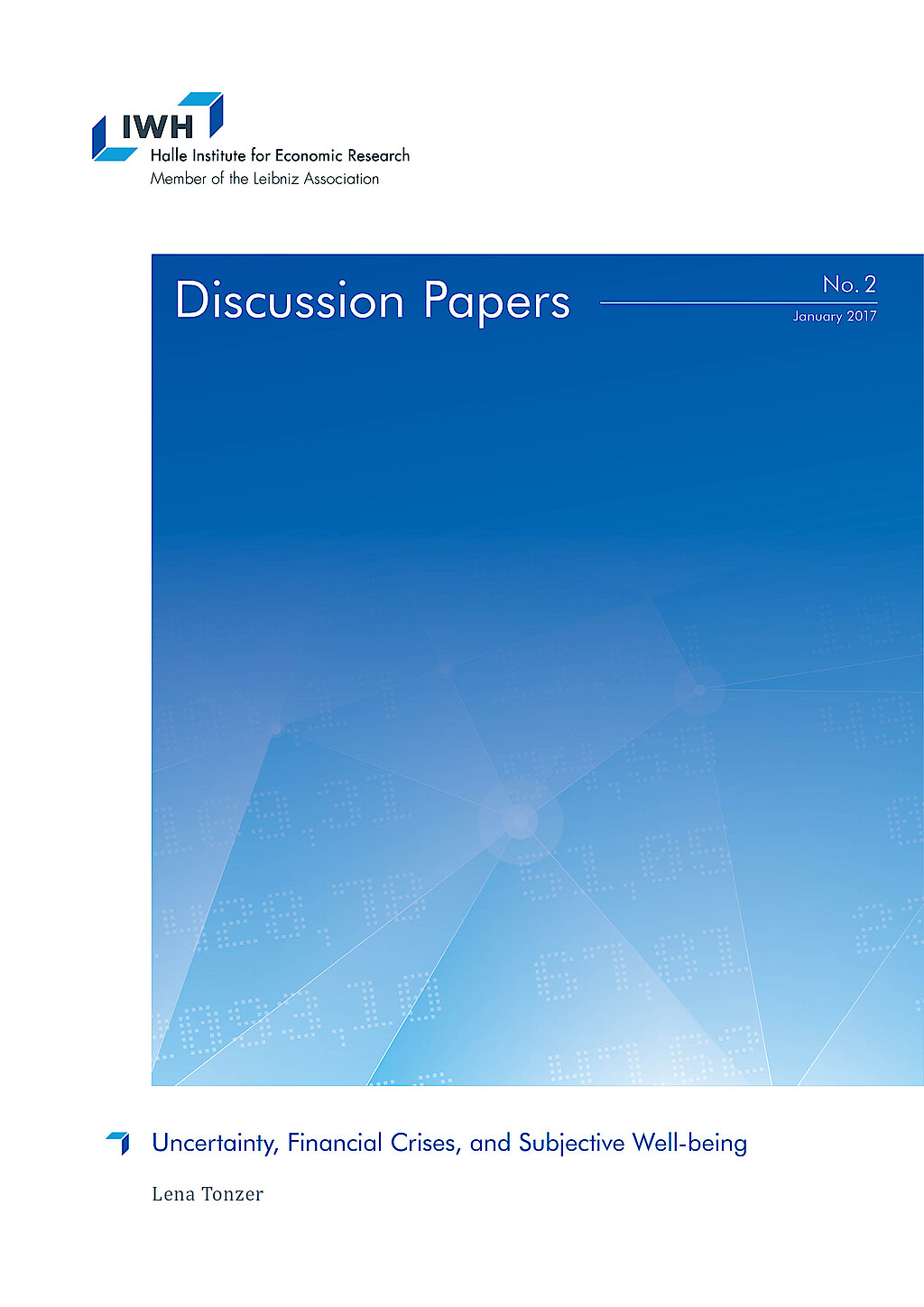
Uncertainty, Financial Crises, and Subjective Well-being
in: IWH Discussion Papers, Nr. 2, 2017
Abstract
This paper focuses on the effect of uncertainty as reflected by financial market variables on subjective well-being. The analysis is based on Eurobarometer surveys, covering 20 countries over the period from 2000 to 2013. Individuals report lower levels of life satisfaction in times of higher uncertainty approximated by stock market volatility. This effect is heterogeneous across respondents: The probability of being unsatisfied is higher for respondents who are older, less educated, and live in one of the GIIPS countries of the euro area. Furthermore, higher uncertainty in combination with a financial crisis increases the probability of reporting low values of life satisfaction.

To Separate or not to Separate Investment from Commercial Banking? An Empirical Analysis of Attention Distortion under Multiple Tasks
in: IWH Discussion Papers, Nr. 2, 2016
Abstract
In the wake of the 2008/2009 financial crisis, a number of policy reports (Vickers, Liikanen, Volcker) proposed to separate investment banking from commercial banking to increase financial stability. This paper empirically examines one theoretical justification for these proposals, namely attention distortion under multiple tasks as in Holmstrom and Milgrom (1991). Universal banks can be viewed as combining two different tasks (investment banking and commercial banking) in the same organization. We estimate pay-performance sensitivities for different segments within universal banks and for pure investment and commercial banks. We show that the pay-performance sensitivity is higher in investment banking than in commercial banking, no matter whether it is organized as part of a universal bank or in a separate institution. Next, the paper shows that relative pay-performance sensitivities of investment and commercial banking are negatively related to the quality of the loan portfolio in universal banks. Depending on the specification, we obtain a reduction in problem loans when investment banking is removed from commercial banks of up to 12 percent. We interpret the evidence to imply that the higher pay-performance sensitivity in investment banking directs the attention of managers away from commercial banking within universal banks, consistent with Holmstrom and Milgrom (1991). Separation of investment banking and commercial banking may indeed be associated with a reduction in risk in commercial banking.















